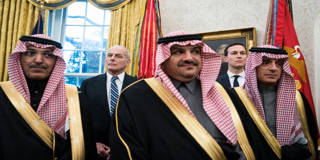Following the massacre of protesting students in Beijing’s Tiananmen Square in 1989, US President George H.W. Bush’s administration limited its sanctions and kept lines of communication open, owing to China's strategic importance. Would a similar policy toward Saudi Arabia prove viable?
NEW YORK – The 2006 documentary “An Inconvenient Truth” highlights former US Vice President Al Gore’s efforts to alert his fellow Americans to the perils of global warming. What made the truth inconvenient is that avoiding catastrophic climate change would require people to live differently and, in some cases, give up what they love (such as gas-guzzling cars).
For nearly two months, we have all been living with another inconvenient truth – ever since Jamal Khashoggi, a Saudi journalist working for The Washington Post and living in the United States, disappeared after entering Saudi Arabia’s consulate in Istanbul.
A large part of the truth is undeniable: Khashoggi was murdered by individuals with close ties to the Saudi government and its de facto leader, Crown Prince Mohammed bin Salman (widely known as MBS). Weeks of official Saudi denials and lies only reinforced the conclusion – now also the reported judgment of the CIA – that the murder was premeditated and approved at the top. MBS’s direct role may not be 100% proven, but most observers familiar with Saudi Arabia harbor little doubt. This is not a system that tolerates much freelancing.

NEW YORK – The 2006 documentary “An Inconvenient Truth” highlights former US Vice President Al Gore’s efforts to alert his fellow Americans to the perils of global warming. What made the truth inconvenient is that avoiding catastrophic climate change would require people to live differently and, in some cases, give up what they love (such as gas-guzzling cars).
For nearly two months, we have all been living with another inconvenient truth – ever since Jamal Khashoggi, a Saudi journalist working for The Washington Post and living in the United States, disappeared after entering Saudi Arabia’s consulate in Istanbul.
A large part of the truth is undeniable: Khashoggi was murdered by individuals with close ties to the Saudi government and its de facto leader, Crown Prince Mohammed bin Salman (widely known as MBS). Weeks of official Saudi denials and lies only reinforced the conclusion – now also the reported judgment of the CIA – that the murder was premeditated and approved at the top. MBS’s direct role may not be 100% proven, but most observers familiar with Saudi Arabia harbor little doubt. This is not a system that tolerates much freelancing.